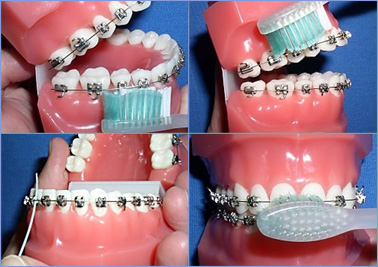
|
 |
 |
|
Life with Braces Eating with Braces
Lastly, chewing on hard things (for example, pens, pencils, cell phone antennas) can damage braces. Damaged braces will cause treatment to take longer, and the result to be less than optimal. Many "emergency" appointments to repair damaged braces can be avoided merely by staying away from problem foods.
When you get your braces on, you may feel some general soreness in your mouth. It is normal for your teeth to be tender to biting pressures for three to five days. To feel better, you may rinse your mouth with a warm salt water mouthrinse. Dissolve one teaspoonful of salt in 8 ounces of warm water, and rinse your mouth vigorously. If the tenderness is more uncomfortable, take aspirin, Tylenol (acetaminophen), or Advil (ibuprofen), or whatever you normally take for headache or similar pain. You should expect that your lips, cheeks, and tongue may also become irritated for one to two weeks as they toughen and become accustomed to your new braces. We will give you soft wax that can be placed on any rough surfaces until your mouth has gotten used to the new braces. Wax should also be used if there are any poking wires, or if any brackets come loose and become irritating. Wax is your 1-stop shop for fixing nearly every type of sore your braces may cause. Remember to keep in mind that as your mouth becomes more and more used to the braces, your reliance on wax will become less and less. Loosening of Teeth This is to be expected throughout treatment. Don't worry! It is completely normal and temporary. Teeth must loosen first so they can be moved in the right direction. In fact, it is usual for teeth to be somewhat loose the entire time you are in braces. When the braces are removed, the teeth will again become rigidly fixed in their new, straight positions. Compliance with Treatment To achieve the best result, it is very important that you work with us to successfully complete the treatment plan. Coming in for regularly-scheduled adjustments is certainly important, but other factors will also determine the outcome. The teeth and jaws can only move toward their corrected positions if you follow our directions carefully, staying away from foods that will damage your appliances. Additionally, making sure to wear rubber bands (or other "extras") is key to achieving the sensational smile we are all aiming for. Additionally, it is extremely important to maintain excellent oral hygiene and to visit your dentist for cleanings and check-ups throughout your orthodontic treatment. Keeping Things Clean It is more important than ever to brush and floss regularly during orthodontic treatment! This is one of the only ways to ensure that the teeth and gums will be healthy after your orthodontic treatment is complete. We recommend that our patients rinse nightly with Phos-Flur, a special Colgate rinse to add strength and hardness to the teeth while they are in braces. Phos-flur has been clinically proven to reduce decalcification (white spots that can become cavities) by 58%! Regular and frequent visits to the dentist are extremely important during orthodontic treatment. Dr. Kuperstein recommends that each patient see his or her pediatric or family dentist at least once every six months, or more frequently under certain circumstances.
Athletics If you play sports, it's important that you consult us for special precautions. Dr. Kuperstein almost always recommend a protective mouthguard for athletic activities. Mouth guards are inexpensive, comfortable, and come in an exciting variety of colors and patterns! Injuries during sports are common. Most of the time, minor bumps and bruises are not a problem. Many injuries, however, can be made worse if braces are involved. In case of any accident involving the face, check your mouth and the appliances immediately. If teeth are loosened or the appliances damaged, contact us or your dentist immediately. Severe facial injuries, loose or knocked out teeth should be addressed immediately by an oral surgeon, physician and/or general dentist. What if I get a Loose Wire, Bracket, or Band? Don't be alarmed if something comes loose. This happens occasionally. If a wire protrudes and is irritating, use a blunt instrument (like the eraser end of a pencil) and gently push the irritating wire out of the way. Alternatively, wax may be placed over any sharp or poking wires. If any piece comes off entirely, please save it and bring it with you to the office so that we know what it was that happened. If something comes loose, it is not an emergency. However, please call our office and we will assess the situation and advise accordingly. Many repairs can be taken care of by adding time to the next scheduled appointment if it is not too far in the future.
| ||||



